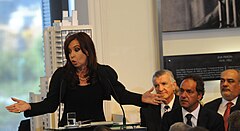Renationalization of YPF

President Cristina Fernández de Kirchner announces the bill to renationalize YPF.
|
|
| Date | 2012 |
|---|---|
| Location | Argentina |
| Participants | Government of Argentina, Repsol, Government of Spain, Petersen Group |
| Outcome | Nationalization bill approved by Congress and signed on May 5, 2012; compensation agreement reached on November 27, 2013, for US$5 billion for a 51% stake. |
| Website | www.ypf.com |
President Cristina Fernández de Kirchner of Argentina introduced a bill on April 16, 2012, for the partial renationalization of YPF, the nation's largest energy firm. The state would purchase a 51% share, with the national government controlling 51% of this package and ten provincial governments receiving the remaining 49%. The bill was overwhelmingly approved by both houses of Congress, and was signed by the president on May 5.
The government of Argentina eventually agreed to pay $5 billion in compensation to Repsol, which had previously owned YPF.
YPF was founded in 1922 as the first oil company in the world to be established as a state enterprise. The company grew to become largest in its sector in Argentina, and despite the divestiture of a sizable percentage of its extractive, refining, logistic, and retail infrastructure during its 1993 privatization, YPF in 2012 operated 52% of the nation's refinery capacity and accounted for 57% of the national market in gasoline and other motor fuels. Its share of petroleum and natural gas production nationally was 34% and 23%, respectively, in 2011; company revenues that year were US$13.7 billion.
The firm was privatized in 1993 on the initiative of President Carlos Menem and Economy Minister Domingo Cavallo pursuant to the State Reform Law of 1989, which authorized the president to present bills to Congress for the privatization of any of the numerous state enterprises in operation at the time.Madrid-based Repsol acquired a majority stake in 1999. Oil and gas production subsequently weakened while demand increased, and in 2011 Argentina recorded the first energy trade deficit since 1987.
Investment in exploration at YPF as a percentage of profits had been far below those in most other Repsol subsidiaries, and fell from 30 new wells in 1998 to 8 in 2010 (French energy firm Total S.A. overtook YPF as the leading oil driller in Argentina). Its reserves of crude and natural gas fell 60% and 67% respectively between 1999 and 2011, and declines in output at the firm represented 54% of the nation's lost oil production and 97% in the case of natural gas.
...
Wikipedia
